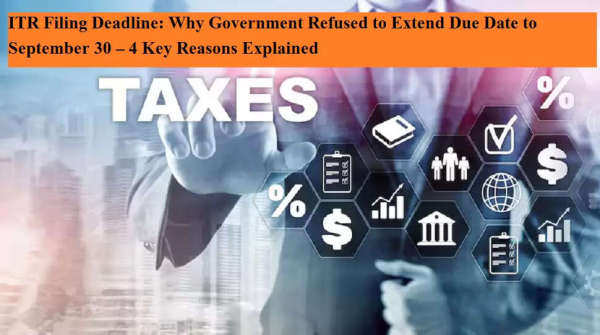
Despite repeated appeals from tax professionals, the government has decided not to extend the Income Tax Return (ITR) filing deadline to September 30, 2025. Instead, the Central Board of Direct Taxes (CBDT) provided only a 24-hour relief, shifting the due date from September 15 to September 16, 2025. This decision, announced at the very last minute on September 15, raised several questions. Here are the four major reasons why the government resisted pushing the deadline further.
For the assessment year 2025–26, the original ITR deadline for non-audit cases was July 31, 2025. However, in May itself, the government had already extended it to September 15, 2025, giving taxpayers nearly six weeks of extra time. According to officials, this extension was meant to provide “sufficient opportunity” to file returns.
By mid-September, most taxpayers had already complied. To address the last-minute rush and minor portal slowdowns, the CBDT added a one-day grace period, moving the date to September 16. But the government made it clear that taxpayers should not expect another extension.
One of the key triggers for deadline extensions in previous years has been large-scale technical glitches on the Income Tax e-filing portal. This time, however, the system largely functioned smoothly. While some users reported minor delays and login issues, there were no major outages or disruptions that would justify a nationwide extension.
Experts note that the government now follows a strict policy: extensions are granted only if the digital infrastructure fails to handle peak traffic. Since over 7 crore returns were successfully filed by September 15, the CBDT had little reason to extend the date.
By the night of September 15, nearly 7.3 crore ITRs had been filed. This figure even surpassed the 7.28 crore returns filed by July 31, 2024, under the previous deadline. By 6 p.m. on September 15 itself, over 7 crore returns had been processed, reflecting massive compliance by taxpayers.
The Income Tax Department also shared updates on social media platform X (formerly Twitter), confirming the record numbers and thanking both taxpayers and professionals for their efforts. The department urged those who were yet to file to complete the process immediately instead of waiting for further extensions.
A major concern for the government was that frequent extensions dilute the significance of deadlines. If taxpayers begin assuming that the due date will always be pushed back, it encourages procrastination, delays in tax collection, and slower processing of refunds.
Officials explained that extending the deadline beyond September 16 would have set the wrong precedent. By keeping the cut-off strict, the government is sending a clear message: ITR deadlines must be respected.
Many taxpayers worry that missing the September deadline means they cannot file at all. That’s not the case. Returns can still be filed until December 31, 2025, but they will be considered belated returns. Such filings attract penalties, interest charges, and loss of certain benefits like carrying forward business or capital losses.
Therefore, experts strongly advise taxpayers to file their returns as soon as possible. Delays not only increase the financial burden but also risk unnecessary complications with future assessments.
The government’s refusal to extend the ITR filing deadline to September 30 is based on four clear reasons—an earlier extension was already granted, the portal faced no serious glitches, a record number of taxpayers had already filed, and the importance of maintaining deadline discipline.
For taxpayers, the message is straightforward: do not expect further relief. With the due date now firmly set at September 16, 2025, any further delay will lead to penalties and lost benefits. If you are among those who have not yet filed, it is in your best interest to act immediately.